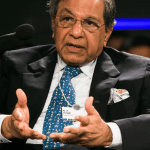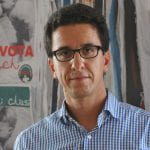Participants:
 James E. Foster is the Oliver T. Carr Professor of International Affairs and Professor of Economics at the George Washington University. He received his Ph.D. in economics from Cornell University and holds a Doctorate Honoris Causa from Universidad Autónoma del Estado de Hidalgo (Mexico). Professor Foster’s research focuses on welfare economics — using economic tools to evaluate and enhance the wellbeing of people. His joint 1984 Econometrica paper (with Joel Greer and Erik Thorbecke) is one of the most cited papers on poverty. It introduced the FGT Index, which has been used in thousands of studies and was employed in targeting the Progresa CCT program in México. Other research includes work on economic inequality with Amartya Sen; on the distribution of human development with Luis Felipe Lopez-Calva and Miguel Szekely; on multidimensional poverty with Sabina Alkire; and on literacy with Kaushik Basu. Foster regularly teaches introductory and doctoral courses on international development and each spring joins with Professor Basu in presenting an undergraduate course on Game Theory and Strategic Thinking, to which staff and Board members of the World Bank are also invited. Professor Foster is also Research Fellow at the Oxford Poverty and Human Development Initiative (OPHI), Department of International Development, Oxford University, and a member of the Human Capital and Economic Opportunity (HCEO) Working Group, Becker Friedman Institute for Research in Economics, University of Chicago. He also previously served as an Advisory Board Member on the World Bank’s Commission on Global Poverty.
James E. Foster is the Oliver T. Carr Professor of International Affairs and Professor of Economics at the George Washington University. He received his Ph.D. in economics from Cornell University and holds a Doctorate Honoris Causa from Universidad Autónoma del Estado de Hidalgo (Mexico). Professor Foster’s research focuses on welfare economics — using economic tools to evaluate and enhance the wellbeing of people. His joint 1984 Econometrica paper (with Joel Greer and Erik Thorbecke) is one of the most cited papers on poverty. It introduced the FGT Index, which has been used in thousands of studies and was employed in targeting the Progresa CCT program in México. Other research includes work on economic inequality with Amartya Sen; on the distribution of human development with Luis Felipe Lopez-Calva and Miguel Szekely; on multidimensional poverty with Sabina Alkire; and on literacy with Kaushik Basu. Foster regularly teaches introductory and doctoral courses on international development and each spring joins with Professor Basu in presenting an undergraduate course on Game Theory and Strategic Thinking, to which staff and Board members of the World Bank are also invited. Professor Foster is also Research Fellow at the Oxford Poverty and Human Development Initiative (OPHI), Department of International Development, Oxford University, and a member of the Human Capital and Economic Opportunity (HCEO) Working Group, Becker Friedman Institute for Research in Economics, University of Chicago. He also previously served as an Advisory Board Member on the World Bank’s Commission on Global Poverty.
 Jennifer G. Cooke is director of the Institute for African Studies at The George Washington University Elliott School of International Affairs. The Institute serves as central for research, scholarly discussion, and debate on issues relevant to Africa. She is a professor of practice in international affairs, teaching courses on U.S. Policy Toward Africa and Transnational Security Threats in Africa. Cooke joined George Washington University in August 2018, after 18 years as director of the Africa Program at the Center for Strategic and International Studies (CSIS), where she led research and analysis on political, economic, and security dynamics in Africa. While at CSIS, Cooke directed projects on a wide range of African issues, including on violent extremist organizations in the Sahel and Lake Chad Basin, China’s growing role in Africa, democracy and elections in Nigeria, religion and state authority in Africa, “stress-testing” state stability in Africa, Africa’s changing energy landscape, and more. She is a frequent writer and lecturer on U.S.-Africa policy and has provided briefing, commentary, and testimony to the media, US Congress, AFRICOM leadership and the U.S. military. She has traveled widely in Africa and has been an election observer in Sierra Leone, Ghana, Liberia, Mali, and Nigeria. As a teenager, she lived in Cote d’Ivoire and the Central African Republic. She holds an M.A. in African studies and international economics from the Johns Hopkins University School of Advanced International Studies (SAIS) and a B.A. in government, magna cum laude, from Harvard University.
Jennifer G. Cooke is director of the Institute for African Studies at The George Washington University Elliott School of International Affairs. The Institute serves as central for research, scholarly discussion, and debate on issues relevant to Africa. She is a professor of practice in international affairs, teaching courses on U.S. Policy Toward Africa and Transnational Security Threats in Africa. Cooke joined George Washington University in August 2018, after 18 years as director of the Africa Program at the Center for Strategic and International Studies (CSIS), where she led research and analysis on political, economic, and security dynamics in Africa. While at CSIS, Cooke directed projects on a wide range of African issues, including on violent extremist organizations in the Sahel and Lake Chad Basin, China’s growing role in Africa, democracy and elections in Nigeria, religion and state authority in Africa, “stress-testing” state stability in Africa, Africa’s changing energy landscape, and more. She is a frequent writer and lecturer on U.S.-Africa policy and has provided briefing, commentary, and testimony to the media, US Congress, AFRICOM leadership and the U.S. military. She has traveled widely in Africa and has been an election observer in Sierra Leone, Ghana, Liberia, Mali, and Nigeria. As a teenager, she lived in Cote d’Ivoire and the Central African Republic. She holds an M.A. in African studies and international economics from the Johns Hopkins University School of Advanced International Studies (SAIS) and a B.A. in government, magna cum laude, from Harvard University.
 Andrew Tiffin is a senior economist at the IMF, working in the regional studies division of the Fund’s African Department. He is also keenly involved in the effort to incorporate artificial intelligence/machine-learning techniques into the standard analytical toolkit of the Fund. Previously, he has worked on Middle Eastern countries, with a particular interest in refugee issues in Jordan and Lebanon, as well as numerous countries in Europe–he was part of the Italy team during the debt crisis of 2012, and part of the Russia team for the global financial crisis of 2008. Raised in Sydney, Andrew is an Australian national. He received his post-graduate training at Princeton University, where he obtained both a Ph.D. in economics and an M.P.A. in international relations. In addition to his work with the Fund, Andrew has held positions at the Reserve Bank of Australia, and with the Australian Government.
Andrew Tiffin is a senior economist at the IMF, working in the regional studies division of the Fund’s African Department. He is also keenly involved in the effort to incorporate artificial intelligence/machine-learning techniques into the standard analytical toolkit of the Fund. Previously, he has worked on Middle Eastern countries, with a particular interest in refugee issues in Jordan and Lebanon, as well as numerous countries in Europe–he was part of the Italy team during the debt crisis of 2012, and part of the Russia team for the global financial crisis of 2008. Raised in Sydney, Andrew is an Australian national. He received his post-graduate training at Princeton University, where he obtained both a Ph.D. in economics and an M.P.A. in international relations. In addition to his work with the Fund, Andrew has held positions at the Reserve Bank of Australia, and with the Australian Government.
 Louise Fox is an experienced development economist who specializes in strategies for employment creation, opportunity expansion, economic empowerment, and poverty reduction. She has advised governments in the developed and developing world, international organizations, and philanthropic and non-profit organizations on problem diagnosis, strategies for results, and outcome measurement. She held full-time positions at USAID (as Chief Economist) and at the World Bank. She is currently affiliated with the African Growth Initiative at the Brookings Institution and the Blum Center for Developing Economies, University of California, Berkeley. She was previously affiliated with the Overseas Development Institute, where she led a major research project. Louise has published in the areas of inclusive growth, structural transformation, youth employment, the political economy of poverty reduction, gender and women’s economic empowerment, employment, labor markets, and labor regulation, pension reform, reform of child welfare systems, social protection, effective public expenditures in the social sectors, and female-headed households and child welfare. Her most recent book was Youth Employment in Sub-Saharan Africa, published by the World Bank in 2014.
Louise Fox is an experienced development economist who specializes in strategies for employment creation, opportunity expansion, economic empowerment, and poverty reduction. She has advised governments in the developed and developing world, international organizations, and philanthropic and non-profit organizations on problem diagnosis, strategies for results, and outcome measurement. She held full-time positions at USAID (as Chief Economist) and at the World Bank. She is currently affiliated with the African Growth Initiative at the Brookings Institution and the Blum Center for Developing Economies, University of California, Berkeley. She was previously affiliated with the Overseas Development Institute, where she led a major research project. Louise has published in the areas of inclusive growth, structural transformation, youth employment, the political economy of poverty reduction, gender and women’s economic empowerment, employment, labor markets, and labor regulation, pension reform, reform of child welfare systems, social protection, effective public expenditures in the social sectors, and female-headed households and child welfare. Her most recent book was Youth Employment in Sub-Saharan Africa, published by the World Bank in 2014.
 Seung Mo Choi is a Senior Economist working on regional surveillance in the IMF’s African Department. He has worked on banking crises, financial market policies, climate change, low-income country issues, and capacity development, including in the IMF’s European Department and in the Institute for Capacity Development. His research has been published in economics and finance journals such as International Economic Review. Prior to joining the IMF, he worked as an Assistant Professor at Washington State University and obtained a Ph.D. in economics from the University of Chicago and a B.A. in economics from Seoul National University.
Seung Mo Choi is a Senior Economist working on regional surveillance in the IMF’s African Department. He has worked on banking crises, financial market policies, climate change, low-income country issues, and capacity development, including in the IMF’s European Department and in the Institute for Capacity Development. His research has been published in economics and finance journals such as International Economic Review. Prior to joining the IMF, he worked as an Assistant Professor at Washington State University and obtained a Ph.D. in economics from the University of Chicago and a B.A. in economics from Seoul National University.
 Stephen C. Smith is Professor of Economics and International Affairs at George Washington University. In 2018 he was UNICEF Senior Fellow at the UNICEF Office of Research-Innocenti, Florence, Italy. Smith received his Ph.D. in Economics from Cornell University and has been a Fulbright Research Scholar, a Jean Monnet Research Fellow, a Visiting Fellow at the Brookings Institution, a Nonresident Senior Fellow at Brookings, a Fulbright Senior Specialist, a member of the Advisory Council of BRAC USA, and an Associate Editor of the Journal of Economic Behavior and Organization. He has twice served as Director of the Institute for International Economic Policy at GWU. Smith is the co-author with Michael Todaro of Economic Development (12th Edition, Pearson, 2014). He is also author of Ending Global Poverty: A Guide to What Works (paperback edition Palgrave Macmillan, 2009), and co-editor with Jennifer Brinkerhoff and Hildy Teegen of NGOs and the Millennium Development Goals: Citizen Action to Reduce Poverty (Palgrave Macmillan, 2007). He is also author or coauthor of about 45 professional journal articles and many other publications. Smith’s recent research has focused on extreme poverty and strategies and programs to address it; and on the economics of adaptation and resilience to climate change in low-income countries, emphasizing autonomous adaptation by households and communities and its effects, and adaptation financing.
Stephen C. Smith is Professor of Economics and International Affairs at George Washington University. In 2018 he was UNICEF Senior Fellow at the UNICEF Office of Research-Innocenti, Florence, Italy. Smith received his Ph.D. in Economics from Cornell University and has been a Fulbright Research Scholar, a Jean Monnet Research Fellow, a Visiting Fellow at the Brookings Institution, a Nonresident Senior Fellow at Brookings, a Fulbright Senior Specialist, a member of the Advisory Council of BRAC USA, and an Associate Editor of the Journal of Economic Behavior and Organization. He has twice served as Director of the Institute for International Economic Policy at GWU. Smith is the co-author with Michael Todaro of Economic Development (12th Edition, Pearson, 2014). He is also author of Ending Global Poverty: A Guide to What Works (paperback edition Palgrave Macmillan, 2009), and co-editor with Jennifer Brinkerhoff and Hildy Teegen of NGOs and the Millennium Development Goals: Citizen Action to Reduce Poverty (Palgrave Macmillan, 2007). He is also author or coauthor of about 45 professional journal articles and many other publications. Smith’s recent research has focused on extreme poverty and strategies and programs to address it; and on the economics of adaptation and resilience to climate change in low-income countries, emphasizing autonomous adaptation by households and communities and its effects, and adaptation financing.
 Preya Sharma is a senior economist in the African Department of the IMF where she is Special Assistant to the Director. Her research has focused on structural transformation, the future of work, and digitalization in sub-Saharan Africa, as well as emerging market crises and development. Before joining the IMF she was the Head of Emerging Markets at HM Treasury in the UK. She holds a Masters in Public Administration in International Development from the Harvard Kennedy School and a BSc in Economics from the London School of Economics.
Preya Sharma is a senior economist in the African Department of the IMF where she is Special Assistant to the Director. Her research has focused on structural transformation, the future of work, and digitalization in sub-Saharan Africa, as well as emerging market crises and development. Before joining the IMF she was the Head of Emerging Markets at HM Treasury in the UK. She holds a Masters in Public Administration in International Development from the Harvard Kennedy School and a BSc in Economics from the London School of Economics.

Esther Chibesa has 20 years of diverse corporate banking experience, serving in various capacities for Citigroup in Kenya, Uganda, Tanzania and Zambia. In her current role, Esther is driven by Africa’s promise, and seeks to realize the opportunities presented at the intersection of technology, regulatory evolution, and inclusive finance. She leads a team in the visioning and execution of a transaction services strategy that addresses the continent’s ongoing financial services transformation. She leads the execution and deployment of innovative treasury & trade finance solutions for multinational corporations, financial institutions and public sector organizations across Sub-Saharan Africa. In her various roles within the organization, she has championed the development of several groundbreaking solutions such as fully integrated tax & fiscal collections systems, receivables digitization solutions, automated mobile money channels and settlement processes, and enhanced, digitized trade and supply chain solutions. She is a past recipient of the prestigious Top 40 Women under 40 (Business Daily Kenya), past member of the Junior Achievement Zambia Board, is an alum of University of Botswana (First Class Honors), and holds an MBA from Heriot Watt Business School, Edinburgh University.
 N.K. Singh is a prominent Indian economist, academician, and policymaker. He is currently Chairman of the 15th Finance Commission. Prior to this position, he served as a member of Parliament in the Rajya Sabha, from 2008 to 2014. He also presided as Chairman of the Fiscal Responsibility and Budget Management Review Committee (FRBM) in 2016.
N.K. Singh is a prominent Indian economist, academician, and policymaker. He is currently Chairman of the 15th Finance Commission. Prior to this position, he served as a member of Parliament in the Rajya Sabha, from 2008 to 2014. He also presided as Chairman of the Fiscal Responsibility and Budget Management Review Committee (FRBM) in 2016. Junaid Kamal Ahmad is the Country Director for the World Bank in India. He joined the World Bank’s Delhi office on 1 September 2016. Junaid, a Bangladeshi national, was formerly the Chief of Staff to World Bank Group President Jim Yong Kim. He joined the World Bank in 1991 as a Young Professional and worked on infrastructure development in Africa and Eastern Europe. He has since held several management positions, leading the Bank’s program in diverse regions including Africa, the Middle East and North Africa, as well as in India and South Asia. He holds a PhD in Applied Economics from Stanford University, an MPA from Harvard University, and a BA in Economics from Brown University.
Junaid Kamal Ahmad is the Country Director for the World Bank in India. He joined the World Bank’s Delhi office on 1 September 2016. Junaid, a Bangladeshi national, was formerly the Chief of Staff to World Bank Group President Jim Yong Kim. He joined the World Bank in 1991 as a Young Professional and worked on infrastructure development in Africa and Eastern Europe. He has since held several management positions, leading the Bank’s program in diverse regions including Africa, the Middle East and North Africa, as well as in India and South Asia. He holds a PhD in Applied Economics from Stanford University, an MPA from Harvard University, and a BA in Economics from Brown University. Indira Rajaraman holds a PhD in Economics from Cornell University. She was previously Professor of Economics at the Indian Institute of Management Bangalore, and Reserve Bank of India Chair Professor at the National Institute of Public Finance and Policy, Delhi. She also served as a member of the 13th Finance Commission; and Member of the Central Board of Directors, Reserve Bank of India and of the Technical Advisory Committee for Monetary Policy. She has over 75 research publications in international and national journals and edited volumes and writes regularly in the financial press. She was a member of several official committees that shaped the process of financial and fiscal reform over the last three decades.
Indira Rajaraman holds a PhD in Economics from Cornell University. She was previously Professor of Economics at the Indian Institute of Management Bangalore, and Reserve Bank of India Chair Professor at the National Institute of Public Finance and Policy, Delhi. She also served as a member of the 13th Finance Commission; and Member of the Central Board of Directors, Reserve Bank of India and of the Technical Advisory Committee for Monetary Policy. She has over 75 research publications in international and national journals and edited volumes and writes regularly in the financial press. She was a member of several official committees that shaped the process of financial and fiscal reform over the last three decades.






 Viral V. Acharya is the C.V. Starr Professor of Economics in the Department of Finance at New York University Stern School of Business (NYU-Stern) and an Academic Advisor to the Federal Reserve Banks of New York and Philadelphia. Viral was a Deputy Governor at the Reserve Bank of India (RBI) during 23rd January 2017 to 23rd July 2019 in charge of Monetary Policy, Financial Markets, Financial Stability, and Research. His speeches while at the RBI will release in the end of July 2020 in the form of a book titled “Quest for Restoring Financial Stability in India” (SAGE Publications India), with a new introductory chapter “Fiscal Dominance: A Theory of Everything in India”. Viral completed Bachelor of Technology in Computer Science and Engineering from Indian Institute of Technology, Mumbai in 1995 and Ph.D. in Finance from NYU-Stern in 2001. Prior to joining Stern, he was at London Business School (2001-2008), the Academic Director of the Coller Institute of Private Equity at LBS (2007-09) and a Senior Houblon-Normal Research Fellow at the Bank of England (Summer 2008). Viral’s primary research interest is in theoretical and empirical analysis of systemic risk of the financial sector, its regulation and its genesis in government-induced distortions, an inquiry that cuts across several other strands of research – credit risk and liquidity risk, their interactions and agency-theoretic foundations, as well as their general equilibrium consequences. He has published articles in the American Economic Review, Journal of Finance, Journal of Financial Economics, Review of Financial Studies, Review of Finance, Journal of Business, Journal of Financial Intermediation, Rand Journal of Economics, Journal of Monetary Economics, Journal of Money, Credit and Banking, and Financial Analysts Journal. He is currently associate editor of the Review of Corporate Finance Studies (RCFS, 2011-) and Review of Finance (2006-), and was an editor of the Journal of Financial Intermediation (2009-12) and associate editor of the Journal of Finance (2011-14).
Viral V. Acharya is the C.V. Starr Professor of Economics in the Department of Finance at New York University Stern School of Business (NYU-Stern) and an Academic Advisor to the Federal Reserve Banks of New York and Philadelphia. Viral was a Deputy Governor at the Reserve Bank of India (RBI) during 23rd January 2017 to 23rd July 2019 in charge of Monetary Policy, Financial Markets, Financial Stability, and Research. His speeches while at the RBI will release in the end of July 2020 in the form of a book titled “Quest for Restoring Financial Stability in India” (SAGE Publications India), with a new introductory chapter “Fiscal Dominance: A Theory of Everything in India”. Viral completed Bachelor of Technology in Computer Science and Engineering from Indian Institute of Technology, Mumbai in 1995 and Ph.D. in Finance from NYU-Stern in 2001. Prior to joining Stern, he was at London Business School (2001-2008), the Academic Director of the Coller Institute of Private Equity at LBS (2007-09) and a Senior Houblon-Normal Research Fellow at the Bank of England (Summer 2008). Viral’s primary research interest is in theoretical and empirical analysis of systemic risk of the financial sector, its regulation and its genesis in government-induced distortions, an inquiry that cuts across several other strands of research – credit risk and liquidity risk, their interactions and agency-theoretic foundations, as well as their general equilibrium consequences. He has published articles in the American Economic Review, Journal of Finance, Journal of Financial Economics, Review of Financial Studies, Review of Finance, Journal of Business, Journal of Financial Intermediation, Rand Journal of Economics, Journal of Monetary Economics, Journal of Money, Credit and Banking, and Financial Analysts Journal. He is currently associate editor of the Review of Corporate Finance Studies (RCFS, 2011-) and Review of Finance (2006-), and was an editor of the Journal of Financial Intermediation (2009-12) and associate editor of the Journal of Finance (2011-14). Liaquat Ahamed is the author of the critically acclaimed best-seller, Lords of Finance: The Bankers Who Broke the World, about central bankers during the Great Depression of 1929-1932. The book won the 2010 Pulitzer Prize for History, the 2010 Council on Foreign Relations Arthur Ross Gold Medal, and the 2009 Financial Times-Goldman Sachs Best Business Book of the Year Award. Ahamed was a professional investment manager for twenty-five years. He has worked at the World Bank in Washington, D.C., and the New York-based partnership of Fischer Francis Trees and Watts, where he served as chief executive. He is currently a director of the Putnam Funds. He is on the board of trustees of the Journal of Philosophy, the Sun Valley Writers’ Conference and a former trustee of the Brookings Institution and the New America Foundation. He has degrees in economics from Harvard and Cambridge.
Liaquat Ahamed is the author of the critically acclaimed best-seller, Lords of Finance: The Bankers Who Broke the World, about central bankers during the Great Depression of 1929-1932. The book won the 2010 Pulitzer Prize for History, the 2010 Council on Foreign Relations Arthur Ross Gold Medal, and the 2009 Financial Times-Goldman Sachs Best Business Book of the Year Award. Ahamed was a professional investment manager for twenty-five years. He has worked at the World Bank in Washington, D.C., and the New York-based partnership of Fischer Francis Trees and Watts, where he served as chief executive. He is currently a director of the Putnam Funds. He is on the board of trustees of the Journal of Philosophy, the Sun Valley Writers’ Conference and a former trustee of the Brookings Institution and the New America Foundation. He has degrees in economics from Harvard and Cambridge. Rakesh Mohan is one of India’s senior-most economic policymakers and an expert on central banking, monetary policy, infrastructure and urban affairs. Most recently he was executive director at the International Monetary Fund in Washington, D.C., representing India, Sri Lanka, Bangladesh and Bhutan, and chairman, National Transport Development Policy Committee, Government of India, in the rank of a Minister of State. He is also a former deputy governor of the Reserve Bank of India. As deputy governor he was in charge of monetary policy, financial markets, economic research and statistics. In addition to serving in various posts for the Indian government, including representing India in a variety of international forums such as Basel and G20, Mohan has worked for the World Bank and headed prestigious research institutes. He is also Senior Advisor to the McKinsey Global Institute and Distinguished Fellow of Brookings India. Mohan has written extensively on urban economics, urban development, Indian economic policy reforms, monetary policy and central banking.
Rakesh Mohan is one of India’s senior-most economic policymakers and an expert on central banking, monetary policy, infrastructure and urban affairs. Most recently he was executive director at the International Monetary Fund in Washington, D.C., representing India, Sri Lanka, Bangladesh and Bhutan, and chairman, National Transport Development Policy Committee, Government of India, in the rank of a Minister of State. He is also a former deputy governor of the Reserve Bank of India. As deputy governor he was in charge of monetary policy, financial markets, economic research and statistics. In addition to serving in various posts for the Indian government, including representing India in a variety of international forums such as Basel and G20, Mohan has worked for the World Bank and headed prestigious research institutes. He is also Senior Advisor to the McKinsey Global Institute and Distinguished Fellow of Brookings India. Mohan has written extensively on urban economics, urban development, Indian economic policy reforms, monetary policy and central banking. Jennifer G. Cooke is director of the Institute for African Studies at The George Washington University Elliott School of International Affairs. The Institute serves as central for research, scholarly discussion, and debate on issues relevant to Africa. She is a professor of practice in international affairs, teaching courses on U.S. Policy Toward Africa and Transnational Security Threats in Africa. Cooke joined George Washington University in August 2018, after 18 years as director of the Africa Program at the Center for Strategic and International Studies (CSIS), where she led research and analysis on political, economic, and security dynamics in Africa. While at CSIS, Cooke directed projects on a wide range of African issues, including on violent extremist organizations in the Sahel and Lake Chad Basin, China’s growing role in Africa, democracy and elections in Nigeria, religion and state authority in Africa, “stress-testing” state stability in Africa, Africa’s changing energy landscape, and more. She is a frequent writer and lecturer on U.S.-Africa policy and has provided briefing, commentary, and testimony to the media, US Congress, AFRICOM leadership and the U.S. military. She has traveled widely in Africa and has been an election observer in Sierra Leone, Ghana, Liberia, Mali, and Nigeria. As a teenager, she lived in Cote d’Ivoire and the Central African Republic. She holds an M.A. in African studies and international economics from the Johns Hopkins University School of Advanced International Studies (SAIS) and a B.A. in government, magna cum laude, from Harvard University.
Jennifer G. Cooke is director of the Institute for African Studies at The George Washington University Elliott School of International Affairs. The Institute serves as central for research, scholarly discussion, and debate on issues relevant to Africa. She is a professor of practice in international affairs, teaching courses on U.S. Policy Toward Africa and Transnational Security Threats in Africa. Cooke joined George Washington University in August 2018, after 18 years as director of the Africa Program at the Center for Strategic and International Studies (CSIS), where she led research and analysis on political, economic, and security dynamics in Africa. While at CSIS, Cooke directed projects on a wide range of African issues, including on violent extremist organizations in the Sahel and Lake Chad Basin, China’s growing role in Africa, democracy and elections in Nigeria, religion and state authority in Africa, “stress-testing” state stability in Africa, Africa’s changing energy landscape, and more. She is a frequent writer and lecturer on U.S.-Africa policy and has provided briefing, commentary, and testimony to the media, US Congress, AFRICOM leadership and the U.S. military. She has traveled widely in Africa and has been an election observer in Sierra Leone, Ghana, Liberia, Mali, and Nigeria. As a teenager, she lived in Cote d’Ivoire and the Central African Republic. She holds an M.A. in African studies and international economics from the Johns Hopkins University School of Advanced International Studies (SAIS) and a B.A. in government, magna cum laude, from Harvard University. Andrew Tiffin is a senior economist at the IMF, working in the regional studies division of the Fund’s African Department. He is also keenly involved in the effort to incorporate artificial intelligence/machine-learning techniques into the standard analytical toolkit of the Fund. Previously, he has worked on Middle Eastern countries, with a particular interest in refugee issues in Jordan and Lebanon, as well as numerous countries in Europe–he was part of the Italy team during the debt crisis of 2012, and part of the Russia team for the global financial crisis of 2008. Raised in Sydney, Andrew is an Australian national. He received his post-graduate training at Princeton University, where he obtained both a Ph.D. in economics and an M.P.A. in international relations. In addition to his work with the Fund, Andrew has held positions at the Reserve Bank of Australia, and with the Australian Government.
Andrew Tiffin is a senior economist at the IMF, working in the regional studies division of the Fund’s African Department. He is also keenly involved in the effort to incorporate artificial intelligence/machine-learning techniques into the standard analytical toolkit of the Fund. Previously, he has worked on Middle Eastern countries, with a particular interest in refugee issues in Jordan and Lebanon, as well as numerous countries in Europe–he was part of the Italy team during the debt crisis of 2012, and part of the Russia team for the global financial crisis of 2008. Raised in Sydney, Andrew is an Australian national. He received his post-graduate training at Princeton University, where he obtained both a Ph.D. in economics and an M.P.A. in international relations. In addition to his work with the Fund, Andrew has held positions at the Reserve Bank of Australia, and with the Australian Government. Louise Fox is an experienced development economist who specializes in strategies for employment creation, opportunity expansion, economic empowerment, and poverty reduction. She has advised governments in the developed and developing world, international organizations, and philanthropic and non-profit organizations on problem diagnosis, strategies for results, and outcome measurement. She held full-time positions at USAID (as Chief Economist) and at the World Bank. She is currently affiliated with the African Growth Initiative at the Brookings Institution and the Blum Center for Developing Economies, University of California, Berkeley. She was previously affiliated with the Overseas Development Institute, where she led a major research project. Louise has published in the areas of inclusive growth, structural transformation, youth employment, the political economy of poverty reduction, gender and women’s economic empowerment, employment, labor markets, and labor regulation, pension reform, reform of child welfare systems, social protection, effective public expenditures in the social sectors, and female-headed households and child welfare. Her most recent book was Youth Employment in Sub-Saharan Africa, published by the World Bank in 2014.
Louise Fox is an experienced development economist who specializes in strategies for employment creation, opportunity expansion, economic empowerment, and poverty reduction. She has advised governments in the developed and developing world, international organizations, and philanthropic and non-profit organizations on problem diagnosis, strategies for results, and outcome measurement. She held full-time positions at USAID (as Chief Economist) and at the World Bank. She is currently affiliated with the African Growth Initiative at the Brookings Institution and the Blum Center for Developing Economies, University of California, Berkeley. She was previously affiliated with the Overseas Development Institute, where she led a major research project. Louise has published in the areas of inclusive growth, structural transformation, youth employment, the political economy of poverty reduction, gender and women’s economic empowerment, employment, labor markets, and labor regulation, pension reform, reform of child welfare systems, social protection, effective public expenditures in the social sectors, and female-headed households and child welfare. Her most recent book was Youth Employment in Sub-Saharan Africa, published by the World Bank in 2014. Seung Mo Choi is a Senior Economist working on regional surveillance in the IMF’s African Department. He has worked on banking crises, financial market policies, climate change, low-income country issues, and capacity development, including in the IMF’s European Department and in the Institute for Capacity Development. His research has been published in economics and finance journals such as International Economic Review. Prior to joining the IMF, he worked as an Assistant Professor at Washington State University and obtained a Ph.D. in economics from the University of Chicago and a B.A. in economics from Seoul National University.
Seung Mo Choi is a Senior Economist working on regional surveillance in the IMF’s African Department. He has worked on banking crises, financial market policies, climate change, low-income country issues, and capacity development, including in the IMF’s European Department and in the Institute for Capacity Development. His research has been published in economics and finance journals such as International Economic Review. Prior to joining the IMF, he worked as an Assistant Professor at Washington State University and obtained a Ph.D. in economics from the University of Chicago and a B.A. in economics from Seoul National University. Stephen C. Smith is Professor of Economics and International Affairs at George Washington University. In 2018 he was UNICEF Senior Fellow at the UNICEF Office of Research-Innocenti, Florence, Italy. Smith received his Ph.D. in Economics from Cornell University and has been a Fulbright Research Scholar, a Jean Monnet Research Fellow, a Visiting Fellow at the Brookings Institution, a Nonresident Senior Fellow at Brookings, a Fulbright Senior Specialist, a member of the Advisory Council of BRAC USA, and an Associate Editor of the Journal of Economic Behavior and Organization. He has twice served as Director of the Institute for International Economic Policy at GWU. Smith is the co-author with Michael Todaro of Economic Development (12th Edition, Pearson, 2014). He is also author of Ending Global Poverty: A Guide to What Works (paperback edition Palgrave Macmillan, 2009), and co-editor with Jennifer Brinkerhoff and Hildy Teegen of NGOs and the Millennium Development Goals: Citizen Action to Reduce Poverty (Palgrave Macmillan, 2007). He is also author or coauthor of about 45 professional journal articles and many other publications. Smith’s recent research has focused on extreme poverty and strategies and programs to address it; and on the economics of adaptation and resilience to climate change in low-income countries, emphasizing autonomous adaptation by households and communities and its effects, and adaptation financing.
Stephen C. Smith is Professor of Economics and International Affairs at George Washington University. In 2018 he was UNICEF Senior Fellow at the UNICEF Office of Research-Innocenti, Florence, Italy. Smith received his Ph.D. in Economics from Cornell University and has been a Fulbright Research Scholar, a Jean Monnet Research Fellow, a Visiting Fellow at the Brookings Institution, a Nonresident Senior Fellow at Brookings, a Fulbright Senior Specialist, a member of the Advisory Council of BRAC USA, and an Associate Editor of the Journal of Economic Behavior and Organization. He has twice served as Director of the Institute for International Economic Policy at GWU. Smith is the co-author with Michael Todaro of Economic Development (12th Edition, Pearson, 2014). He is also author of Ending Global Poverty: A Guide to What Works (paperback edition Palgrave Macmillan, 2009), and co-editor with Jennifer Brinkerhoff and Hildy Teegen of NGOs and the Millennium Development Goals: Citizen Action to Reduce Poverty (Palgrave Macmillan, 2007). He is also author or coauthor of about 45 professional journal articles and many other publications. Smith’s recent research has focused on extreme poverty and strategies and programs to address it; and on the economics of adaptation and resilience to climate change in low-income countries, emphasizing autonomous adaptation by households and communities and its effects, and adaptation financing. Preya Sharma is a senior economist in the African Department of the IMF where she is Special Assistant to the Director. Her research has focused on structural transformation, the future of work, and digitalization in sub-Saharan Africa, as well as emerging market crises and development. Before joining the IMF she was the Head of Emerging Markets at HM Treasury in the UK. She holds a Masters in Public Administration in International Development from the Harvard Kennedy School and a BSc in Economics from the London School of Economics.
Preya Sharma is a senior economist in the African Department of the IMF where she is Special Assistant to the Director. Her research has focused on structural transformation, the future of work, and digitalization in sub-Saharan Africa, as well as emerging market crises and development. Before joining the IMF she was the Head of Emerging Markets at HM Treasury in the UK. She holds a Masters in Public Administration in International Development from the Harvard Kennedy School and a BSc in Economics from the London School of Economics.
